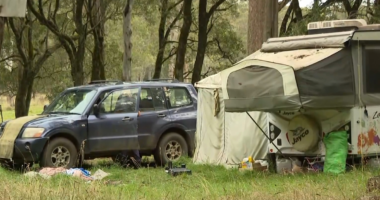Share this @internewscast.com
President Donald Trump during a meeting in the Oval Office of the White House, Tuesday, July 22, 2025, in Washington (AP Photo/Alex Brandon).
A federal judge has mandated that the Trump administration continue funding school mental health services grants, which amount to millions of dollars.
The Department of Education had announced plans earlier this year to cease grant funding for numerous programs, starting as soon as December. However, U.S. District Judge Kymberly Evanson’s recent ruling highlighted that 16 states contesting this decision demonstrated that cutting these services would lead to significant harm.
Judge Evanson cited the University of Buffalo as an example, noting that the termination of its Mental Health Professional Demonstration Grant Program (MHSP) would lead to the loss of 10 internship positions.
“This would have a detrimental impact on both students and rural areas in western New York,” Evanson explained. “Other public universities across California, Colorado, Connecticut, and beyond have established similar programs and reported immediate negative consequences from the sudden termination of collaborations with state and local agencies, loss of personnel and graduate student staff, mid-year cancellation of scholarships and research initiatives, and the immediate cessation of services currently offered to students in the plaintiff states through these grants.”
In her decision, the Seattle-based judge recalled that these grants were initiated in 2018 during President Donald Trump’s first term. “Acknowledging the widespread violence and traumatic events in schools and their adverse impact on the learning environment, Congress allocated funds to the Department to ‘foster learning environments where students feel safe, supported, and prepared to learn,’” she noted.
Following the tragic school shooting in Uvalde, Texas, in the spring of 2022, funding for the MHSP and the School-Based Mental Health Services Grant Program (SBMH) was “substantially increased” by the Biden administration. However, as Trump resumed office this past January with a commitment to cut government spending, numerous grant recipients experienced reductions in their funding.
The increase in funding in 2022 was part of the Bipartisan Safer Communities Act, sponsored by then-Florida Sen. and now-Secretary of State Marco Rubio. However, the Education Department in April took aim at the Biden administration for awarding the grants, saying doing so violated “the letter or purpose of Federal civil rights law,” per NPR.
In their lawsuit, the 16 states argued that the grant cuts “did not comply” with the Administrative Procedure Act (APA), the federal statute governing agency behavior, and also violated the Constitution’s principle establishing a separation of powers between Congress and the executive branch.
The plaintiffs also maintained that none of them were given an individual reasoning for their grants being canceled, with Evanson saying that even the Trump administration acknowledges that “the decisions are generic and identical.” As a result, the states say they are “left guessing why the Grants were discontinued.”
The federal government has argued that it doesn’t need to provide further explanation, as it can decide at its discretion if it is “in the best interest of the federal government to do so.” The judge found this argument “not persuasive.”
She wrote that when courts review an agency decision, they inspect whether the agency “examined ‘the relevant data’ and articulated ‘a satisfactory explanation’ for [the] decision.” And she said in this case, “there is no evidence the Department considered any relevant data pertaining to the Grants at issue and it is undisputed that it provided no Grant-specific explanation of the application of the Department’s new ‘best interest’ criteria.”
Evanson granted the states’ request for a preliminary injunction, barring the Trump administration from effectuating the grant cancellations and ordering a status report within two days of the Monday filing. She noted that the order only applies to the relevant grantees in the 16 states that challenged the decision.
















